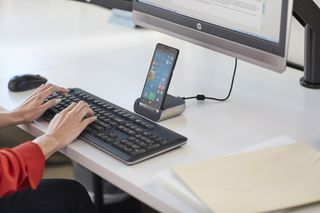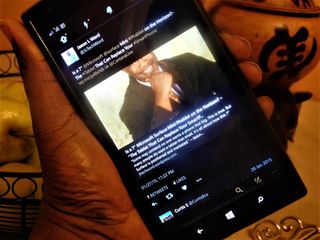Should Windows phone fans be optimistic about Microsoft's mobile strategy?
For many people, the words Microsoft and mobile strategy are mutually exclusive. Consequently, an optimistic outlook that Microsoft's mobile efforts will eventually succeed has long been forsaken by most.

Optimism means hopefulness and confidence about the future or successful outcome of something. Many Windows phone fans, even some who've switched platforms, hope Microsoft's mobile efforts will yield some form of success.
Even a niche market where Microsoft provides a mobile device creates first-party UWP apps, invests in the app bridges and markets its platform with no illusions of overtaking the iPhone and Android would be welcomed by some. That's just a hope that fans have demanded of Microsoft, but at this point, isn't something many expect. There's little optimism or confidence about the future success of Microsoft's mobile strategy.
Mobile strategy required
Few people believe Microsoft even has a mobile strategy. Blog posts, social media commentary, forum content and more reveal just how cynical most people are about Microsoft and mobile. Microsoft burned millions of fans who bought into and advocated for a platform the company has only seemed partially committed to after all.

Still, can Microsoft not have a mobile play in a personal computing age where emerging technologies revolve around smartphones? If Microsoft hopes for relevance in a future of ambient computing by integrating with technologies such as smart homes, in-car computing, IoT devices and more, a mobile device is crucial.
The company's consistent statements about its commitment to mobile, its technological investments and CEO Satya Nadella's promise of mobile devices suggest that this multi billion dollar company's leaders realize mobile is as important as many Windows phone fans believe it is. Still, should fans be optimistic about Microsoft's mobile strategy?
Wait, is there a mobile strategy?
That's a good question, and it's up for debate. I've been a Windows phone user for eleven years and have experienced first-hand Microsoft's endless promises, constant failures, disappointing level of commitment and the limited supply of Windows phones.

The strategy's poor execution was accentuated by hardware requirements and a licensing fee that made getting support from OEMs that used the free and customizable Android, difficult for this late entrant into the consumer smartphone space.
Get the Windows Central Newsletter
All the latest news, reviews, and guides for Windows and Xbox diehards.
A reluctance to embrace its own Universal Windows Platform (UWP) by not launching first-party Universal Windows apps didn't invoke confidence in UWP for developers, OEMs or fans. Enthusiasts have also contended with feelings of betrayal as Nadella's "best-on-Windows-Microsoft-experience" promise, never materialized as Microsoft populated iOS and Android with a parade of Microsoft apps.
To top this all off Microsoft's retrenchment strategy was supposed to ensure Windows phones for Windows fans, the enterprise and value consumers. Unfortunately the last Lumia launched in 2016. Finding Windows phones is getting harder, and ironically not even the Microsoft Store carries them.
Microsoft's mobile strategy has consistently failed.
When we take all of this, and Windows 10 Mobile's imminent post-2018 demise, into account Microsoft's mobile strategy has clearly failed, and the company seems content to let first-party devices fade off the scene. Though OEMs like Alcatel, HP and WileyFox are still investing in Windows 10 Mobile, it seems that Microsoft isn't. So should Windows phone fans be optimistic about Microsoft's mobile strategy given this track record?
Just the facts
Considering the above some may be wondering if there's still a mobile strategy for which a Windows phone fan can be optimistic? That question can be answered with an objective observation of these facts:
- Microsoft's early foray into mobile had the goal of replicating the Windows PC experience on a telephony-enabled pocketable device to what extent was possible given technological limits of the time.
- Microsoft pursued and achieved OneCore to create a Universal Window Platform (UWP) that enables development across form factors.
- Microsoft brought full Windows 10 to ARM which enables always-connected PCs of various form factors and great battery life.
- Continuum allows a pocketable Windows device to connect to monitor, mouse and keyboard to provide a desktop experience. The Continuum experience is getting features like proximity connect and becoming more PC-like with multiple resizable Windows, taskbar app pinning and more.
- As recently as this year Nadella reiterated Microsoft is bringing new devices to market that are not like typical smartphones and that Continuum will enable users to use a mobile device as his only PC.
- Composable Shell (CSHell) brings the same experiences across all Windows devices.
CShell and advanced Continuum.
Some of these facts can be viewed as disparate entities with no ties to one another. Or they can be viewed as having a synergistic relationship with the goal of creating the type of mobile device Microsoft envisioned years ago and that Nadella expressed he's targeting: a pocketable telephony-enabled device that can be a PC.
Should Windows phone fans be optimistic about Microsoft's mobile strategy? I contend that an observer needn't be optimistic at all, in order to follow these facts to the logical conclusion of what Microsoft's strategy may be given these investments.
Optimism not required
An objective observation of the above facts, absent any optimistic presumptions of success, leads to a logical conclusion: Microsoft's original vision of a pocketable, telephony-enabled mobile device with the power of Windows is still Microsoft's goal. This is especially apparent in light of Nadella's statement of imminent Continuum-enabled devices with a unique form factor.

Continuum, Windows 10 on ARM, CSHell and OneCore, are all actual investments by Microsoft and would enable this vision in a way it couldn't be implemented nearly 20 years ago. Nadella's assertion that a Continuum-enabled device that will be able to be a user's only PC supports the analysis that that device will be a PC, albeit one with telephony and which conforms to a user's context.
Joe Belfiore's Windows on ARM comments support Pocket PC vision
Now given Microsoft's history of failures, lack of follow-through and commitment, even if this is the goal, it could fail as a result of internal forces alone. It could also be canceled just before launch like the McLaren and Surface Mini.
Your observation isn't a claim the strategy will succeed.
What should be clear to any reader, however, is that your observation of the facts that lead to this particular strategy analysis are not an indication that you are by default advocating that it will succeed.
You are simply observing the facts, and following them to their logical conclusion for what they suggest may be Microsoft's mobile strategy. You don't have to be optimistic, nor do you have to be pessimistic for that matter. You can just state what it appears Microsoft's mobile strategy is and then enjoy watching to see how it all plays out.
Is Microsoft still pursuing mobile? I say yes😉 Microsoft & Mobile: https://t.co/9YT6O4Us9f Ultramobile PCs: https://t.co/QaWYHu4hwlIs Microsoft still pursuing mobile? I say yes😉 Microsoft & Mobile: https://t.co/9YT6O4Us9f Ultramobile PCs: https://t.co/QaWYHu4hwl— Jason L Ward (@JLTechWord) September 6, 2017September 6, 2017
Jason L Ward is a columnist at Windows Central. He provides unique big picture analysis of the complex world of Microsoft. Jason takes the small clues and gives you an insightful big picture perspective through storytelling that you won't find *anywhere* else. Seriously, this dude thinks outside the box. Follow him on Twitter at @JLTechWord. He's doing the "write" thing!

